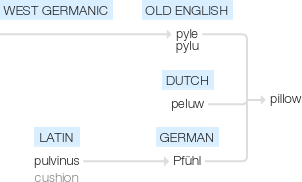Pillow
Old English pyle, pylu, of West Germanic origin; related to Dutch peluw and German Pfühl, based on Latin pulvinus ‘cushion’.
wiktionary
From Middle English pilwe, from Old English pylwe, pylu, pyle(“pillow”), from Proto-West Germanic *pulwī(“pillow”), from Latin pulvīnus(“cushion”), derived from pulvis(“dust, powder”) + -īnus(“-ine”), for the filler of a pillow. Doublet of pulvinus.
etymonline
pillow (n.)
"a head-rest used by a person reclining," especially a soft, elastic cushion filled with down, feathers, etc., Middle English pilwe, from Old English pyle "cushion, bed-cushion, pillow," from West Germanic *pulwi(n) (source also of Old Saxon puli, Middle Dutch polu, Dutch peluw, Old High German pfuliwi, German Pfühl), an early borrowing (2c. or 3c.) from Latin pulvinus "little cushion, small pillow," of uncertain origin. The modern spelling in English is from mid-15c.
Pillow fight (n.) "mock combat using pillows as weapons" is attested from 1837; slang pillow talk (n.) "relaxed intimate conversation between a couple in bed" is recorded by 1939. Pillow-case "washable cloth drawn over a pillow" is by 1745. Pillow-sham is by 1867.
pillow (v.)
"to rest or place on or as on a pillow," 1620s, from pillow (n.). Related: Pillowed; pillowing.
